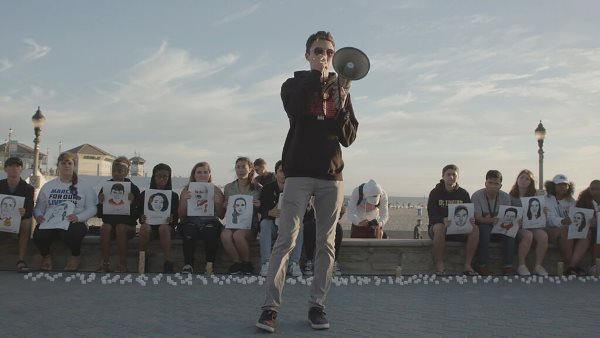
When news of the Stoneman Douglas High School shooting in Parkland, Florida, broke on February 14, 2018, it seemed destined to follow the grotesque formula of every mass shooting since Sandy Hook. Cry outrage, make “thoughts and prayers” comments, push for gun legislation that’ll go nowhere thanks to the National Rifle Association’s stranglehold on politicians, wait for media attention to dwindle, rinse and repeat. Instead, a group of student survivors used their collective anger to “call BS,” as Emma Gonzalez put it, on the political system’s failures across decades of inaction.
Us Kids offers a behind-the-scenes look at their movement’s evolution and, while its narrative feels a bit overambitious at times, it still earns points for an introspective into the teens’ psyches as they accept the responsibility of breaking the NRA as unexpected Zoomer celebrity activists.
This was not a responsibility any of them wanted. Before the shooting, Gonzalez, David Hogg, Jaclyn Corin, Cameron Kasky, and their friends were just regular high schoolers whose lives were upended, and they only became media heroes once they chewed out the adults who willfully sat on their legislative power. Where the 1999 Columbine High School shootings once horrified America at the thought of mass casualties, everything from Sandy Hooks onward signaled a national resignation to their frequency, condemning Gen Z to the possibility of being murdered in a classroom. By juxtaposing moments of casual downtime and self-reflection against their media savviness, director Kim A. Snyder constantly reinforces the simple point that these are still just kids, albeit kids who successfully channeled personal trauma into a weapon for change.
Us Kids documents the rage of an entire generation finally boiling to the surface, from a town hall that left Senator Marco Rubio tongue-tied to the March for Our Lives demonstration being replicated in nearly 800 locations globally. Momentum escalates once the students decide to take this crusade on the road to various American communities via a summer bus tour (the Road to Change). That’s when we get insight into the emotional toll of venting one’s trauma through activism. During this time, they meet Bria Smith, a Black Milwaukee high schooler who, initially skeptical of the Parkland students due to their movement’s limited focus, ends up joining their tour and becoming a friend. As Gonzalez noted, they learned to understand each other better by bonding over individual traumas.
It’s during the Road to Change sections where the film is at its strongest, showcasing the Parkland students’ effectiveness at building conversations with citizens from Martin Luther King III to a MAGA hat wearer who ultimately respects them for talking across the aisle. Sadly, these are small instances of success against an infuriating right-wing media apparatus that willfully delegitimizes the kids as “crises actors”—specifically Hogg—and dismisses their pleas for legislative reform. This not only leads to the teens receiving death threats but multiple instances of being followed on tour by pro-gun critics with weapons on hand. Even as they successfully tank the NRA’s popularity and help boot pro-gun Republicans from office during the 2018 midterms, the psychological ordeal of shouldering such a massive weight in an increasingly toxic cultural discourse shows.
Gonzalez and Hogg receive a lot of screen time as the most recognizable Parkland faces, and Kasky has a mini-arc detailing how the movement’s existential weight eventually overwhelmed him. Sadly, most of the other movement leaders are often regulated to background footage. The major emotional standout, however, is Samantha (Sam) Fuentes, a lesser-known survivor who suffered gunshot wounds in her legs and, more devastatingly, watched her friend Nick die a few feet away.
It’s through Sam we see the more visible signs of a Parkland survivor enduring the long-term repercussions of PTSD. Her work to overcome these memories alongside Nick’s younger brother Alex, who was nearly a shooting victim himself, is heartwarming while also emphasizing the various means by which an individual copes with trauma over time.
Us Kids’ earnestness helps level out the film’s uneven attempts to juggle more than just a focus on the Parkland teens. They are where the documentary’s strength resides: survivors who chose to reject the status quo and lay down the blueprints for a future generation of “smart and woke and awesome” elected officials. It’s not exactly a call to vote, but the film is a reminder that, even if America’s political woes get worse—and they likely will if 2020 is an indicator—the Parkland generation is eventually going to take over the political world. Once that happens, no more excuses will be tolerated.
















Leave A Comment